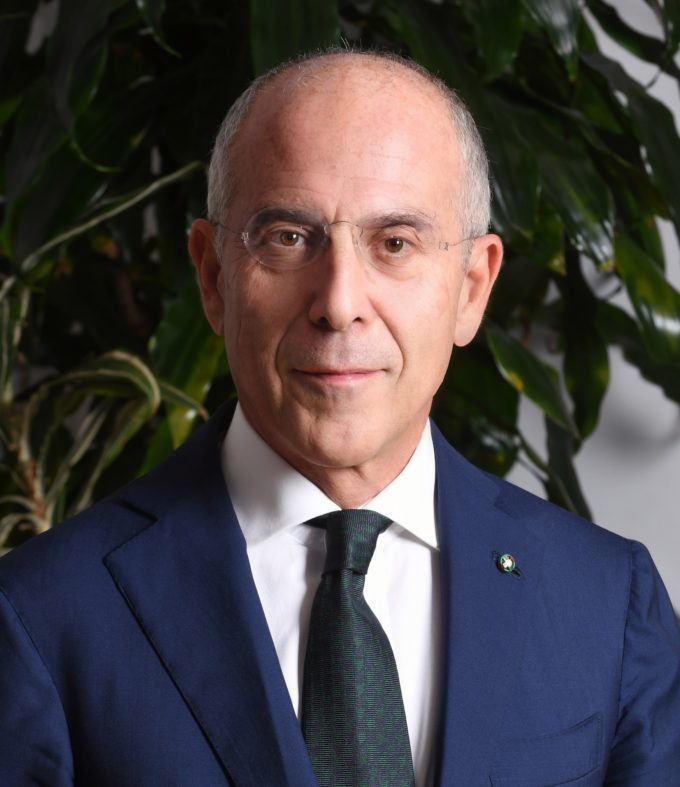Insights from a World-leading Power Company
This interview is part of Greentown Labs’ Climatetech Leadership Series, which profiles top executives from our most committed and climate action-oriented partners.
This spring, Greentown Labs is proud to celebrate two years of partnership with Enel—a multinational power company with more than 86 GW of installed capacity and 74 million end users that’s the world’s largest private renewable operator and the fastest growing player in this space.
Enel’s climate commitments are numerous, from being the first Italian company to pledge to limit the rise in global temperatures to 1.5°C and to be fully decarbonized by 2050, to planning to add 95,000 MW of renewables in the next 10 years. The company was also the first to issue a bond on the US, EU, and UK markets linked to the achievement of Enel’s sustainable objectives related to the U.N. Sustainable Development Goals.
And Enel’s partnership with Greentown and our members is just as storied. When it came time for Enel to open its second Innovation Hub in the United States, the company saw Greentown as a perfect fit. At its Boston Innovation Hub headquarters in Greentown—its 10th worldwide—Enel taps into Boston’s vibrant startup ecosystem, and Greentown is supporting the Innovation Hub through ecosystem connections and targeted innovation scouting. Enel’s North American business unit works with Greentown member company Raptor Maps to manage real-time operations on the corporate’s solar fields through drone-based thermal imaging.
To mark this anniversary of our organizations’ partnership, I recently had the pleasure of speaking with Enel Group CEO and General Manager Francesco Starace. Here are some of the major themes from our discussion, paired with quotes that stuck with me.
Innovation requires not being afraid to make mistakes—and that’s a lesson even the most risk-averse companies can learn.
“When I became CEO of Enel, I knew what the culture of a utility is—it’s a culture of service to the community. On the other side of the coin, there’s the culture that says we cannot make a mistake. If you have this “no mistake” concept, innovation has a tough time. We needed to change our business model to make it sustainable, but without innovation, this was impossible. We started a contest that was called “My Best Failure,” where our employees described to each other a failure and what they learned from it. Then we started asking people to give us problems they couldn’t solve, and they started having the courage to try and to make mistakes. That innovation has fueled our sustainability path.”
In Enel’s view, utilities shouldn’t be competing with each other: they should all be working together and building off of each other in a competition against climate change.
“Innovation is about competition most of the time, but the utility environment is mildly competitive compared to many other industries. So what is the real competition we should be looking at? It’s the competition between electricity and fossil fuels. That is the bottom line that we focus on—we want to win that battle. To do that, anything that makes electricity cheaper, more available, more secure, and more sustainable is great for everyone. We want this to be shared.”
Decarbonizing your company means looking forward, not back.
“You need to have a detached view of what your legacy assets are, and this is not easy for most industries or for people. People tend to cling to their assets, the plants they have, but this comes at the price of being ineffective, the cost curve, and delaying an inevitable conclusion. The most important thing is to take your head and split it in two—and say, ‘While I run these assets before they collapse, I also need to program their end, and something else needs to be built so that they can be safely phased out.’
You have to do that while telling the truth to the people working at them and to the communities sitting around them. You have to help them understand that it’s not the end of the world and they will not lose their jobs—it’s actually the beginning of a new world.”
Green hydrogen can change everything.
“The way in which hydrogen is being generated today can be fully decarbonized. It’s more expensive—can that change? I think it can. First, because renewables today are mainstream and cheap. That’s very important. Second, can you reduce the cost of the investment in an electrolyzer by a factor of six? Why not? Other industries have done it—batteries have done it, [solar] panels have done it. Let’s work at it; we’ll find out in three to five years. If that happens, then the whole universe changes. Hydrogen, without carbon—it’s fantastic.”
Startups looking to work with Enel should be transparent about their technology’s capabilities and limits.
“First of all, tell us the truth. Tell us what you can do, what you think you can do. Be honest about what you really think you can do and solve for us, and try to understand more than we do. Typically we come thinking that we know everything, and we don’t. Focus on what we think we know and we don’t—if you can figure that out, you really have a key to our hearts.”
—
Emily Reichert is the CEO of Greentown Labs, the largest climatetech startup incubator in North America, on a mission to support entrepreneurs tackling the biggest climate and environmental challenges.
Watch the full conversation below!


